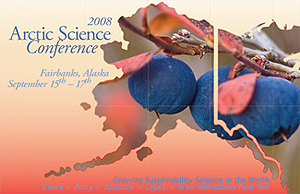Arctic science conference to focus on northern sustainability
Arctic science conference to focus on northern sustainability
Submitted by Marmian Grimes
Phone: 907-474-7902
09/11/08

More than 150 scientists are expected to attend the 59th annual American Association for the Advancement of Science Arctic Division conference in Fairbanks, Alaska Sept. 15-17 2008.
The conference will focus on sustainability science and the people of the Arctic. Sessions will cross multiple disciplines and focus on observed and continuing changes in northern regions, as well as on the responses to those changes by northern residents now and in the future. Highlights include sessions on indigenous people and knowledge, northern engineering, terrestrial responses to climate change, circumpolar health and interdisciplinary education, as well as nearly a dozen others. The conference will also host the 15th Arctic Round Table, a meeting of scientists and policymakers to discuss current issues in the Arctic. This year’s roundtable will focus on changes in the Arctic and beyond.
Conference plenary speakers include Maribeth Murray of the University of Alaska Fairbanks; Hajo Eicken, UAF researcher and head of the International Polar Year North by 2020 project; James Rattling Leaf of the South Dakota School of Mines and Technology; Catherine Middlecamp of the University of Wisconsin-Madison; Peter Schlosser of Columbia University; and Buck Sharpton, vice chancellor for research at UAF.
The AAAS Arctic Division conference is one of the nation’s largest gatherings of arctic scientists. Conference sessions will take place at the Westmark Fairbanks Hotel in downtown Fairbanks.
2008 AAAS Arctic Division conference
Selected presentations
Effects of vehicle traffic on moose populations
University of Alaska Fairbanks graduate student Colin Shanley will present the findings of his study on the balance between subsistence game populations and human access to hunting areas. In his study of moose and subsistence moose hunters in the Yakutat area, he found that both male and female moose were likely to be displaced by high-use ATV trails and roads. His presentation will also include recommendations for mitigating these effects to maintain a sustainable moose harvest.Alaska artists’ role in the birth of Denali National Park
Kesler Woodward, art professor emeritus at UAF, will give a presentation on how the work of some of Alaska’s important historical painters, such as Belmore Browne, Sydney Laurence and Eustace Ziegler, brought Mt. McKinley to the attention of the American public. He will focus on how that awareness led to the creation of what is now Denali National Park and how artists’ images of the mountain continue to influence how Americans view the region and the state.The relationship between coal particle size and CO2 emissions
Rajive Ganguli, an associate professor in UAF’s Institute of Northern Engineering, will discuss his study of coal and carbon dioxide emissions. His work focused on whether differences in particle size distribution of pulverized coal affected how much carbon dioxide was released when that coal was burned in a power plant. His findings will be available both in an oral presentation and in the conference’s poster session.Potential costs of climate change in Alaska
Peter Larsen of The Nature Conservancy will present information from a study on how rapid climate change may affect Alaska’s public infrastructure and the costs associated with those effects. Larsen led the study while he was a researcher at the University of Alaska Anchorage. The project team coupled climate change predictions with civil engineering "rules of thumb" to estimate how things like accelerated coastal erosion, permafrost thaw and flooding affect replacement costs for nearly 16,000 structures in the state. He will also speak on how the research effort demonstrates how adaptation strategies could offset these effects.Health effects of resource development in the Arctic
James Edwin, a researcher at the Institute of Social and Economic Research at UAA, will give a presentation on how climate change in the Arctic may affect subsistence and natural resource management, and, in turn, the health of the people in arctic regions. His work focuses on using a health impact assessment tool that allows a policy, program or project to be evaluated for its potential effect on a population’s health.Traditional knowledge and village corporation management
Dixie Masek Dayo, an assistant professor in the UAF College of Rural and Community Development, will present a case study on the Bean Ridge Corporation of Manley Hot Springs. While it is one of the smaller village corporations established under the Alaska Native Claims Settlement Act, the corporation has surmounted some of the challenges faced by other small entities by integrating traditional knowledge into corporate decisionmaking. The practice has provided both dividends for shareholders and land for community development.Infrastructure modeling for North Slope development planning
Larry Bright of the U.S. Fish and Wildlife Service will speak on the potential use of infrastructure modeling in planning for resource development on the North Slope of Alaska. His presentation will focus on the increased interest in oil and gas, coal, and other resources in the region and the potential effects of that development on wildlife and subsistence activities. He will discuss how modeling future infrastructure scenarios may help managers forecast and thus avoid potential conflicts between industrial development and wildlife and subsistence users on the North Slope.
CONTACT: Marmian Grimes, UAF public information officer, at 907-474-7902 or via e-mail at marmian. grimes@uaf.edu. Jenn Wagaman, UAF research outreach coordinator, at 907-474-5082 or via e-mail at jenn@alaska.edu.
ON THE WEB: www.arcticaaas.org
NOTE TO EDITORS: Media covering the conference may register for free by contacting Grimes at the e-mail addresses above. A synopsis of several presentations is attached. Grimes will be available during the conference via mobile phone at 907-460-4750 or at the on-site media room.
MLG/9-11-08/031-09


